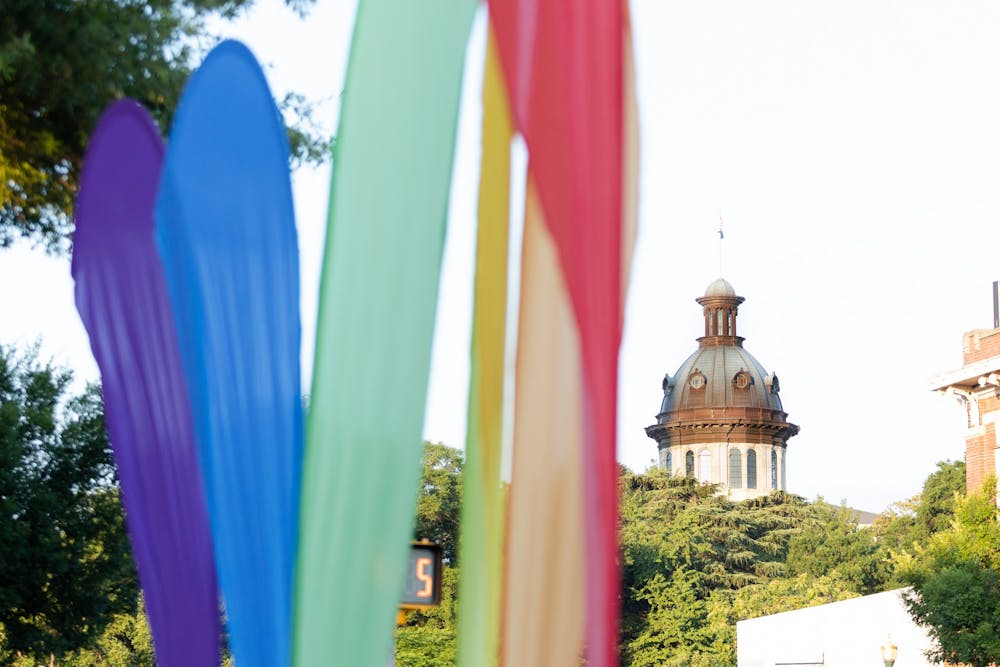While June is considered the National LGBTQIA+ Pride month, Pride needs to be celebrated and recognized all year long.
Pride means a lot of different things to people in the community because everyone has a different story when it comes to their sexual identity.
"Pride means being able to accept who you are. And remembering where you came from, and those before you came from, it's all about heart, integrity,"Andria Temptations, a supporter of Outfest, said.
Outfest, which is hosted by South Carolina Pride Movement an organization that hosts South Carolina's largest LGBTQIA+ event in October of every year, is held on the first Saturday of June to celebrate pride with appearances from drag queens and local LGBTQIA+ organizations like Free Mom Hugs and the Harriet Hancock Center Foundation.
Having events and organizations like the Harriet Hancock Center Foundation active throughout the year is a great way to remind people of the importance of pride outside of June, bring a safe space to South Carolina and educate people on the history of the Pride movement.
On June 28, 1969, police raided the Stonewall Inn, a gay club in New York City, arresting many patrons because of their sexual orientation. This led to a six day riot that led to a revolution known as Pride.
The Stonewall riots were one of the first instances where members of the LGBTQIA+ community identified as part of the community loudly and openly since it was dangerous to do so at the time and even today.
There has been great progress in both acceptance and federal laws, from the riots to creating a world where it's safer for everyone to live. In 2002, a year before the Supreme Court ruled in Lawrence v Texas that members of the same sex could legally engage in sexual relations. The acceptance rate across America for the LGBTQIA+ community was at 51%. In 2019, it was at 72%.
The Supreme Court when presented with a case called Obergefell v. Hodges in 2015, ruled in favor of same-sex marriage, which is one of the biggest steps for equality for the LGBTQIA+ community even though it was only by a 5-4 win.
Even with this win for the LGBTQIA+ community, it didn't take away the hatred, but organizations like Free Mom Hugs, try to create a space for LGBTQIA+ members to go when they have no one else.
Free Mom Hugs, a nonprofit organization for those who may not have a mom to hug because of their sexual orientation, was at Outfest giving hugs to everyone. They educate the public on the community and fight for human rights. But it's also important to them that this fight isn't just limited to one month.
"I would say it's especially important to celebrate outside of June because of South Carolina's ranking in welcoming and supporting the LGBTQ community," Julie Turner, a member of Free Mom Hugs, said. "I think in a place like South Carolina, we need to step up more."
South Carolina has a bad rating for acceptance and is among 22 states that are considered low or negative tolerance, making it sometimes a dangerous place for the community. Hate crimes are disgustingly common among people who aren't cis-gendered, heterosexual, non-disabled white men. One crime that led to the FBI identifying hate crimes that could be more than a person's race, religion or origin was the death of Matthew Shepard, who was murdered solely based on his sexual orientation.
While celebrating Pride with events like Outfest and learning more about the history of Pride during June is important, everyone needs to remember that being part of the LGBTQIA+ community isn't contained to just one month.
"Be proud today and every day," Jeff March, president of South Carolina Pride, said. "We have to have our own celebrations and our special times when we get recognized for who we are and everything we've done."
Not only should Pride be celebrated all year long but by everyone. If people have a loved one or are close to someone that identifies as part of the community, they should be proud to stand with them and look to where they can fight for the community's rights.
“It’s important for everyone to get involved and to, you know, just be neighborly and know your neighbors,” Matthew Butler, vice president of the Harriet Hancock Center Foundation, said. “It’s important for the community to get together those folks who are identified as part of the LGBTQ+ community, it’s important for our allies to surround us and be apart of us.”
The month of June should be celebrated and is a time to acknowledge the history of the Pride movement, but being LGBTQIA+ doesn't start and end in June and that pride doesn't either.

